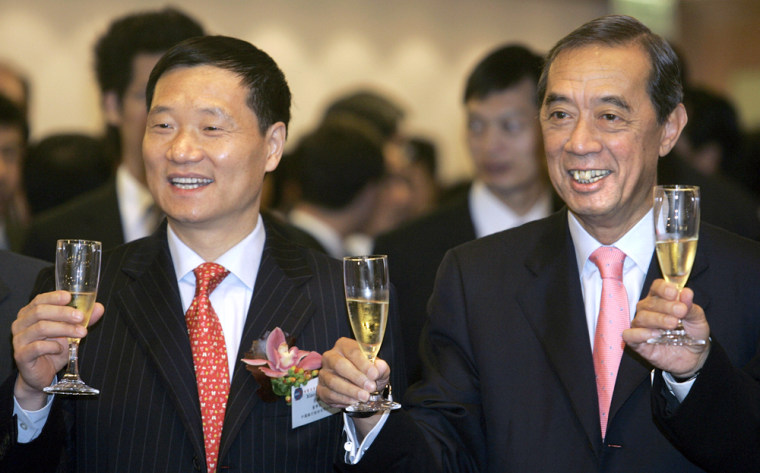Bank of China has been mired in bad loans. Some of its top executives have been locked away for corruption. But that didn’t stop the lender’s initial public offering — the world’s biggest in six years — from soaring 15 percent on Thursday in Hong Kong.
China’s No. 2 lender got a boost from several factors: the success of previous Chinese bank IPOs, the nation’s rip-roaring economic growth, strong government backing and major foreign investors who lined up for big stakes.
“Today is a very exciting day,” the bank’s chairman, Xiao Gang, said before clinking glasses of champagne at the stock exchange as trading began for the IPO, which raised $9.7 billion amid heavy demand.
The IPO’s success “thoroughly shows that investors around the world are full of confidence about the Chinese economy’s long-term prosperity and the country’s reforms,” said Xiao.
The stock quickly began climbing and closed at $3.40 Hong Kong dollars (43 U.S. cents), up 15 percent from its IPO price of $2.95 Hong Kong dollars each (38 U.S. cents).
Bank of China’s rise defied the general trend on the Hong Kong market, which saw the blue-chip Hang Seng Index fall 1.3 percent on worries about a rise in U.S. interest rates. About $2.58 billion worth of the bank’s shares changed hands.
“Investors still remain upbeat about the future of the Bank of China, so there’s solid support on the buy-side today,” said Louis Wong, director of Phillip Securities (HK) Ltd.
The strong debut was a big contrast to another highly anticipated IPO: China Construction Bank Corp’s listing, which closed unchanged from its IPO price on its debut in October.
“When CCB listed in October, there were some concerns about the overall economy in general, which slowed its share price increase,” said Alistair Scarff, banking analyst at Merrill Lynch & Co. in Hong Kong. “But investors have seen the strong performance of CCB and are more willing to bet BOC will do the same.”
China Construction Bank, the nation’s No. 4 lender, has posted remarkable growth since its IPO, rising 43 percent.
The country’s fifth-largest lender, Bank of Communications Ltd., has seen even more spectacular gains since it listed last June, climbing 91 percent.
But Pauline Dan, executive director of equities at Manulife Asset Management in Kong, said Bank of China’s share price would likely remain around its current level as investors examine the bank’s fundamentals.
“We will have to pay more attention to China’s macro numbers for the second quarter and the bank’s loan growth and watch out for rising non-performing loans,” Dan said.
One of the major worries about Bank of China has been its heavy lending to companies. An economic slowdown could cause the lender’s nonperforming loan ratio to swell again.
Before a government bailout, the bank’s ratio of nonperforming loans to total lending was reported at an eye-popping 33 percent in 2003. The bank has said the number has fallen to 4.4 percent.
A legacy of corruption has also cast a shadow on the IPO. One of the bank’s former chairmen, Wang Xuebing, is serving a 12-year prison term for taking bribes. A former president of the bank’s Hong Kong branch, Liu Jinbao, was given a suspended death sentence last August for embezzlement. Such sentences are usually commuted to life in prison.
Steven Y.L. Cheung, a professor of finance at City University of Hong Kong, said that investors feel confident that China’s government won’t let graft and bad loans weigh down the bank.
“I think they’re buying into the future of the Chinese economy,” Cheung said about investors. “The bank is simply too big to fall, and we see the determination of the banking reform by the central government.”
Another vote of confidence came from key foreign strategic investors, who put a total $5.1 billion into the bank. They included Singapore’s Temasek Holdings Pte., UBS AG (UBS) and a consortium led by Royal Bank of Scotland Group PLC.
Twelve corporate investors included Bank of Tokyo-Mitsubishi UFJ Ltd., Bank of East Asia Ltd., and Hong Kong tycoon Li Ka-shing’s Cheung Kong (Holdings) Ltd. and Hutchison Whampoa Ltd. They bought a combined $2.16 billion in shares.
